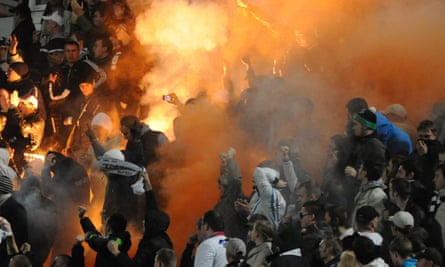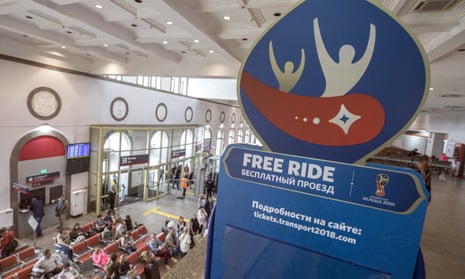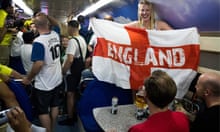England football fans visiting Russia for the World Cup are at serious risk of homophobic, racist and anti-British attacks and have been offered only “vague reassurance” about their safety by the Foreign Office and police, MPs have warned.
The security risk will be greatest away from England qualifying matches or city centre fan zones, the foreign affairs select committee said in a report published on Friday. Anyone wearing the St George flag may be a target for attack, the MPs say.
The risk of violence facing more than 10,000 England fans travelling to the tournament, which starts on Thursday, has been made worse MPs say, by the collapse in Anglo-Russian relations after the poisoning in Salisbury of Sergei Skripal, the Russian former double agent.
The poisoning has led to the expulsion of more than 23 UK diplomats from Russia, and the complete closure of the UK’s St Petersburg consular office. The senior diplomat overseeing UK preparations was one of those selected for expulsion.
The MPs say that although cooperation between the UK and Russian police has continued despite the freeze in diplomatic relations, the risks to England fans attending games in which England is not participating is acute.
The MPs also say Russia’s homophobic laws mean openly gay and lesbian supporters “not only face the risk of violence from vigilante groups, but lack adequate protection from the state.

“The far-right culture of Russian hooligan groups could place LGBT fans at particular risk of violence.”
Tom Tugendhat, chair of the foreign affairs committee, said: “Vague reassurances from Foreign Office ministers have not been enough to reassure us that UK nationals will be safe, regardless of their background or sexual orientation.”
Only 8,000 travelling fans are thought to have subscribed to the Foreign Office’s travel advice. The MPs say this worryingly low figure means it may be difficult to contact English fans in Russia if a change in the atmosphere, or specific incidents lead the UK government mid-tournament to conclude fans should stay in their hotels or urgently cut short their visit altogether.
A late push is needed by the government to persuade fans to sign up to the foreign office travel alerts, the MPs say.
“The FCO should provide as much information to fans as is possible in the short time still available. UK football fans must know how to manage the risks so that they are safe from the fear of violence,” Tugendhat said.
During its research the committee received evidence from Pride in Football, an alliance of LGBT fan groups, of two threatening emails it had received that used homophobic language, and warned that LGBT people would not be welcome in Russia. One made explicit threats of violence, and included an image of a knife.
Russian hooligans using the social media network VKontakte have said that England fans who travel to the World Cup risk making a “death covenant”, further evidence shows.
The committee reports that anti-discrimination groups have recorded 190 racist or far-right incidents in Russian football between June 2015 and May 2017. The Russian football federation have dismissed complaints in the past, claiming the abuse is simply a means of expressing rivalry with opposition teams.
Russian and English hooligans clashed violently during the Euro 2016 championships in Marseille when more than 100 English fans were injured and 30 hospitalised.

Most of the Russians identified in the French assault have now been banned from stadiums, the committee says, adding it expects the Russian authorities to suppress any violence through the overwhelming use of near paramilitary force.
Non-uniformed UK police spotters will be present. The UK has also teamed up with 30 other embassies to provide a broader consular service.
But the MPs say this is not going to be able to stop hooligan violence in the margins.
In an attempt to keep known British hooligans out of Russia, a total of 1,751 banning orders are currently in place.
These orders helped ensure no English fans were arrested at the 2010 and 2014 World Cups, or at Euro 2012 in Poland and Ukraine.









